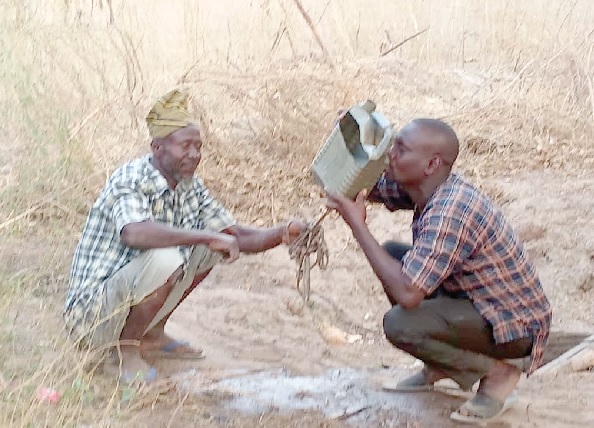
Kpabi residents in dire need of potable water: Depend on stream, well water unsafe for consumption
KPABI, a small farming community with a population of about 3,000 inhabitants, mostly farmers and traders, lies in the Northern belt of the Nanumba North Municipality in the Northern Region.
In view of its location in the northern part of the country, it is grappling with a number of challenges such as lack of potable water for the inhabitants as well as a market centre for the people to undertake their trading activities.
Residents have since been compelled to depend on the polluted Kpahaliga stream and a shallow well to fetch water for domestic use and drinking, especially those who cannot afford to buy sachet water, exposing them to health risks.
Water trickling in
Children from ages nine and above as well as adults who are mostly farmers are seen at the community's broken-down boreholes fetching water but the water only trickles in.
Advertisement
Such a situation is making it difficult for the people to get water for washing, cooking and drinking because not everyone can afford sachet water.
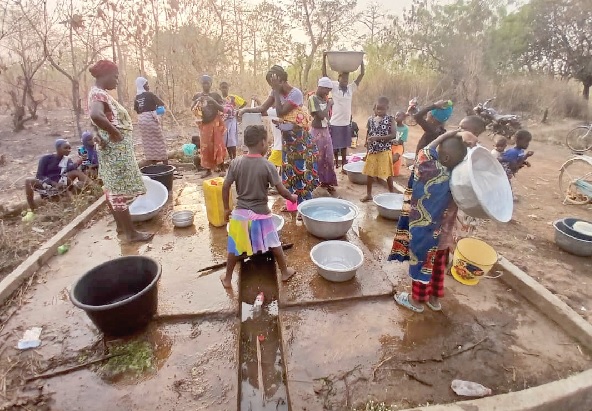
These two boreholes are no longer functioning properly and therefore not serving the purpose anymore due to the manner in which water flows from them because of the inability of the handles to pump the water very well.
Such a situation has also forced some schoolchildren in the area to run on errands in search of water to bath before going to school.
Late to school
In view of this, the schoolchildren attend classes late and this is affecting teaching and learning in the school.
The devastating issue is that the inhabitants of the community now depend on a small shallow well to provide water for them although it is unsafe for drinking because it is polluted.
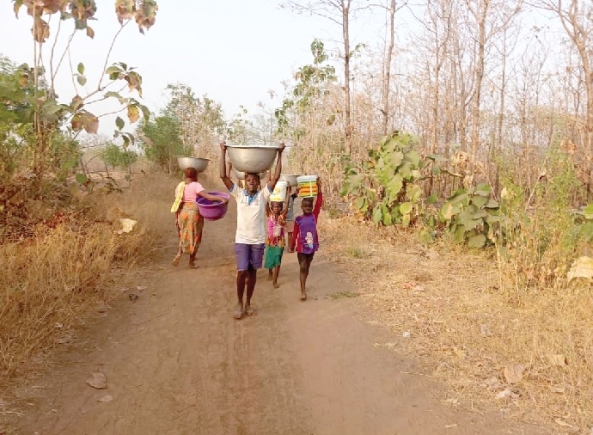
This lack of potable water in the village has impacted negatively on school attendance and performance as schoolchildren have to trek a distance of three kilometres daily to access the main source of water, though polluted.
However, the current situation is likely to expose the people of Kpabi to waterborne diseases such as schistosomiasis (bilharzia) and other related waterborne diseases.
Heavily polluted
The shallow well which serves as one of two alternative sources of water is also heavily polluted; particularly during the dry seasons, it carries all sorts of impurities including debris and human excreta but residents have no choice but to drink from the polluted shallow well and the stream water.
The water is unsafe for drinking and other household chores such as cooking, bathing and washing.
Some community members fear the situation could expand to other nearby communities as residents continue to fetch and use untreated and unwholesome water which they share with cattle and other animals from a contaminated stream in the area.
Kpahaliga stream
The other available source of water, a stream called Kpahaliga, has also been badly polluted and is known to be the source of many diseases in the village.
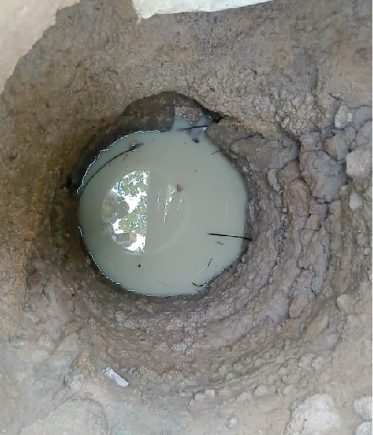
The water in this stream is brownish in colour; literally muddy water, covered by water hyacinths.
The stream is polluted by the dung of cows because they drink from it as they move through it.
The children in the community are always getting sick from typhoid fever and stomach pains when they drink this water.
The absence of potable water is really affecting the entire community.
Bad smell
According to residents, apart from the long distance they have to trek to the stream, they also have to contend with the quality of the water because of the decaying water weeds on the stream as well as the well itself gives off a bad smell, but they have no option but to drink from such sources.
Waterborne diseases
Hamidu Zakari, a resident of the area who is also a farmer, observed that the lack of clean water in the community was likely to spread many waterborne diseases such as bilharzia, dysentery, stomach pains among others in the area.
He said about 65 per cent of sicknesses of the people had been attributed to polluted water and it would be prevented if the community was able to access clean water. “Water is life and very essential in the life of an individual,” he indicated.
Unhygienic
Alhaji Zakari stated that residents risk contracting waterborne diseases: "If care is not taken such diseases can strike in the community since all the sources of water are not hygienic.
He indicated that the situation made teaching and learning difficult because the schoolchildren were always searching for water; they thus “become tired, making teaching and learning very difficult.”
No pipe water
"We don't have pipeborne water here so we drink the polluted stream and well waters because the boreholes are not pumping enough water for us to drink, bath and cook with it.
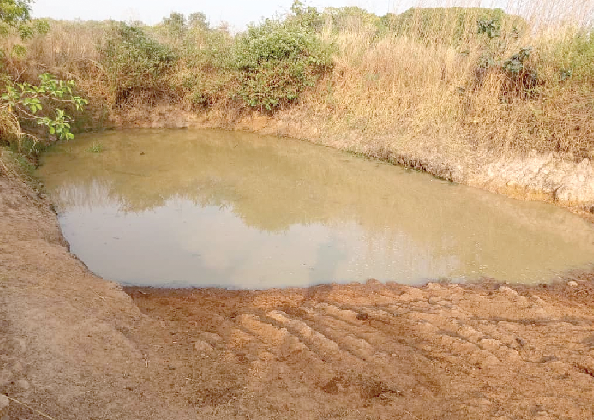
"Both human beings and animals compete daily to drink from the Kpahaliga stream which is not safe for drinking, it only exposes the residents in the area to waterborne diseases", Alhaji Zakari lamented.
Alhaji Zakari therefore appealed to government and benevolent organisations to provide them with potable water to stop the community members, especially children, from drinking the polluted stream and well waters.
Shea butter business
Asana Abdulai, a resident of the area, told the Daily Graphic that potable water had been the major problem facing the community because their main occupation was the shea butter business and that required more water for such business venture.

She said the people had been suffering for many years because of the lack of potable water in the area, since the two boreholes in the community which were expected to provide potable water were not serving their purpose because they did not flow very well.
“When the children come from school, some of them complain of stomach problems with others having symptoms of typhoid fever,” she said.
"We need support from relevant stakeholders, non-governmental organisations, philanthropists and individual organisations to help repair the community's only two boreholes which in the past provided potable water," Mrs Abdulai stated.
Exercise patience
When contacted, the Manager of the Bimbilla Community Water System in the Nanumba North Municipality, Ibrahim Sugri Issah, told the Daily Graphic that the residents should exercise patience since the water situation in the area would soon be addressed.
That, he indicated, would enable the people to get underground water to drink and do their shea butter business without any hindrance.
Mr Issah stated that there was currently an ongoing water project at Kpabi where big water pipes had been laid through to Bimbilla to enable the people to make good use of the underground water since visibility studies carried out showed that more water had been found underground.
Writer's email: haruna.wunpini@graphic.com.gh
